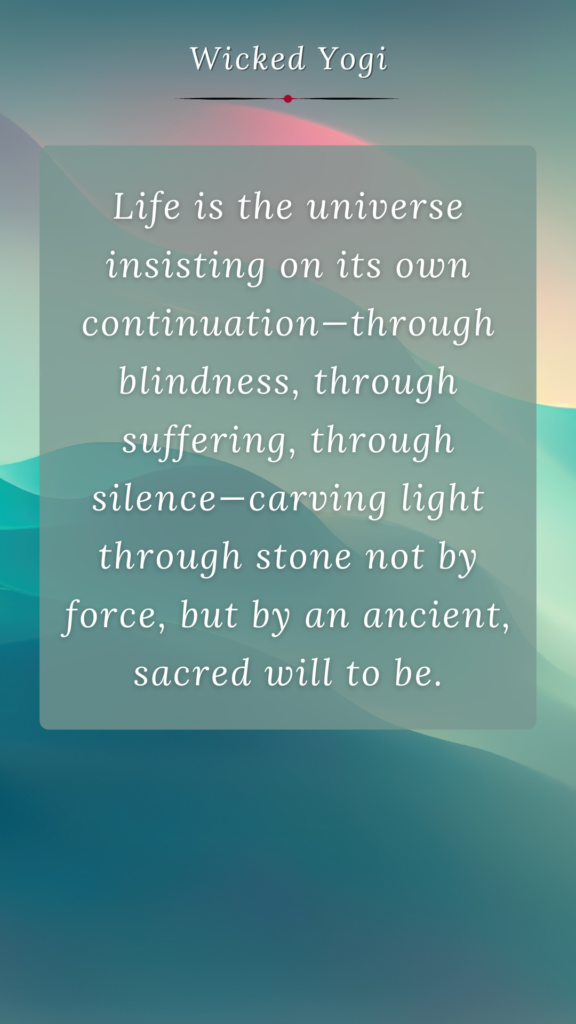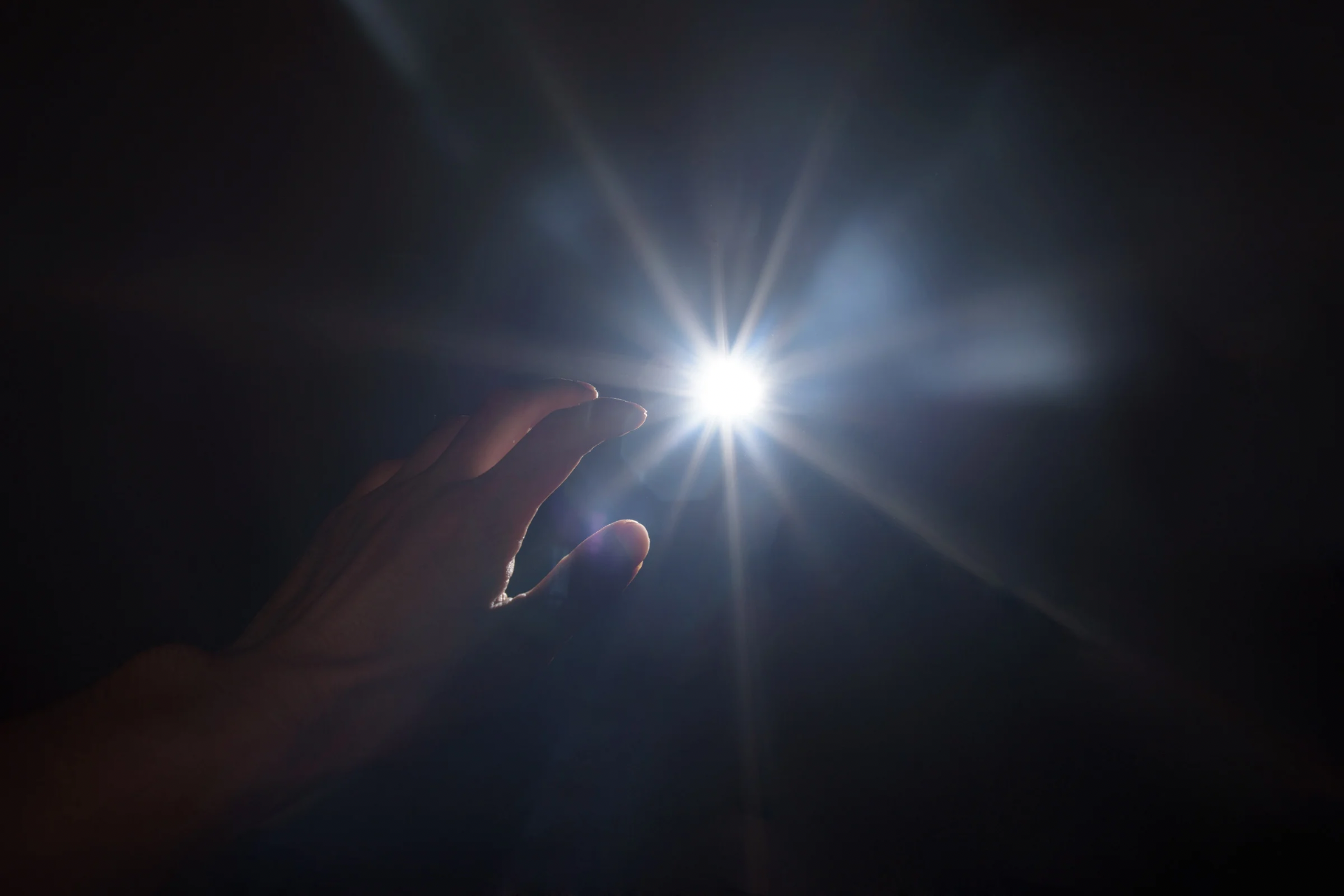Life clings to existence like water seeping through stone—patient, persistent, finding pathways where none should exist. The human spirit burns with a flame that refuses extinguishment, even when the winds of circumstance howl their fiercest. This phenomenon transcends our rational comprehension yet defines our most fundamental reality.
Consider humanity as a living constellation—each soul a distinct point of light, separated by vast distances and circumstances, yet participating in recognizable patterns when viewed from a distance. The billionaire in her glass tower and the man sleeping beneath a highway overpass share something profound beyond all that separates them: both clutch tightly to the raw fact of being. The bedridden patient with organs slowly failing and the athlete at the peak of physical perfection both wake each morning with the same primal hunger for another day's light.
Life clings to existence like water seeping through stone—patient, persistent, finding pathways where none should exist.
What sustains this hunger? What feeds this flame?
When we observe those navigating profound darkness—the blind who construct entire universes without sight—we confront questions beyond mere admiration of resilience. What cosmic lottery assigned them this particular fate? What existential questions must haunt their hours? Imagine awakening each day to a world of perpetual darkness, having never known color, faces, horizons, or stars. What cruel absurdity is this—to exist in a universe primarily designed for visual perception yet be denied the very faculty to perceive it?
Consider the countless moments of vulnerability: the disorientation in unfamiliar spaces, the dependence on others for navigation, the subtle social cues forever missed, the constant vigilance required for the simplest movements. The blind person doesn't merely face inconvenience—they inhabit an alternative reality where the simplest tasks require complex recalibrations, where danger lurks in ordinary spaces, where independence itself becomes a daily conquest rather than a given.
The human spirit burns with a flame that refuses extinguishment, even when the winds of circumstance howl their fiercest.
Yet amid this harsh reality, we witness the mind's remarkable ability to forge new pathways through darkness. Their hands become translators of texture and distance, their hearing transforms into a dimensional awareness that maps spaces through echoes and acoustic shadows. They orchestrate intricate symphonies of movement through environments engineered with visual navigation in mind. Each morning, they confront a world that assumes sight as a baseline, yet they have reimagined that world through sensory languages the seeing never learn to speak. But make no mistake—this adaptation comes at tremendous cost, through struggles most of us, in our sighted privilege, will never fully comprehend.
In the ancient epic Mahabharata, we find the story of Dhritarashtra, a king born blind, and his wife Gandhari, who made the extraordinary choice to blindfold herself for life upon marrying him. Some tell this as a tale of devotion—a wife sharing her husband's darkness out of love. Yet deeper readings reveal something more complex: by choosing blindness rather than becoming her husband's eyes, Gandhari created a metaphorical prison for them both. Where she might have complemented his limitation, she instead mirrored it, leaving their kingdom vulnerable to the misguided ambitions of their hundred sons.
True empathy may sometimes require not that we share another’s darkness, but that we bring light to it.
How often do we find ourselves making Gandhari's choice? Confronted with the limitations of those we love—or the harsh realities of our world—do we blindfold ourselves in sympathy, or do we choose the harder path of clear-sighted compassion? True empathy may sometimes require not that we share another's darkness, but that we bring light to it.
Meanwhile, many blessed with perfect vision walk through life as if wearing blindfolds woven from complacency and distraction. They are like sleepwalkers in an art gallery, surrounded by masterpieces they never pause to perceive. They possess the gift of sight but lack the essential alchemy that transforms mere looking into genuine vision.
This paradox—the sightless who truly see versus the sighted who choose blindness—represents one of existence's most profound riddles. Consider the different existential questions that arise for those born blind versus those who lose sight later in life. For those born without sight, the question isn't "Why did I lose my vision?" but rather "Why was I born into a world primarily designed for sight without the capacity to see it?" They have no memory of color, no reference for how light plays across a landscape, no sense of what they're missing—and yet they must navigate a world built upon visual assumptions.
The blind person doesn’t merely face inconvenience—they inhabit an alternative reality where the simplest tasks require complex recalibrations.
For those who lose sight during their lifetime, the existential crisis takes a different form. They must reconcile the memories of a visual world with their new reality. They grieve not just for functional loss but for a perceptual relationship with existence that has been fundamentally altered. Their question becomes "Who am I now that I cannot see?" as they rebuild their entire understanding of themselves and their place in the world.
Yet within this crucible of questioning emerges something extraordinary. The blind person who navigates the world through touch and sound often develops an intimate relationship with reality that the merely "sighted" never experience. They know the world as a sculptor knows clay—through direct contact, through the wisdom of fingertips that can read textures invisible to eyes. Their reality becomes a universe constructed from non-visual materials, where objects are defined by tactile boundaries and spatial relationships rather than visual shortcuts. In this sense, blindness forces a kind of raw, unfiltered encounter with the world that sight, with its comfortable distance and easy assumptions, can sometimes avoid.
Many blessed with perfect vision walk through life as if wearing blindfolds woven from complacency and distraction.
Life itself behaves like water seeking its level—it finds ways forward that defy our expectations. I once observed a plant growing from a nearly invisible crack in concrete, its tender stem somehow pushing through what appeared to be impenetrable stone. When excavated, its root system revealed an elaborate network that had navigated an impossible labyrinth of obstacles, turning at precise angles when necessary, thinning itself to thread through microscopic openings, all in service to the simple imperative: grow toward light.
Are we so different? The human will to persist demonstrates this same uncanny intelligence. When conventional passages are blocked, we create unconventional ones. When standard senses fail, we develop extraordinary alternatives. The brain rewires itself after injury with an ingenuity that humbles our most sophisticated technologies.
We are walking contradictions—temporary arrangements of atoms that somehow behave as if permanence were possible.
This persistence extends beyond individual adversity to collective trauma as well. Consider the survivors of genocide—those who witnessed the systematic destruction of their communities, their heritage, their families. What keeps them moving forward when they have seen humanity at its most horrific? What inner flame refuses extinguishment even when surrounded by the darkest manifestations of human cruelty?
I have witnessed this phenomenon firsthand as a Kashmiri Pandit who survived genocide. When your entire community faces extinction, when ancestral homes are seized and sacred spaces desecrated, when neighbors become executioners—the very foundation of your existence is challenged. Yet somehow, survivors construct meaning from chaos. We carry forward cultural memories that others tried to erase. We build new communities from the fragments of shattered ones. We transform unbearable pain into testimonies that demand the world remember what happened.
This persistence manifests not as naive optimism but as something far more primal—like the salmon's inexplicable drive to swim upstream against punishing currents, or the arctic tern's navigation of 44,000 annual miles guided by an internal compass we barely comprehend. These creatures don't question their journeys; they simply undertake them, propelled by imperatives encoded in their very being.
Each consciousness represents a unique vantage point from which the universe observes itself.
What of those who, facing unbearable circumstances, do choose to extinguish their flame? Even this most desperate act testifies to life's intensity—for it is precisely because existence matters so profoundly that its weight can sometimes crush us. The desire to end suffering presupposes that suffering itself is meaningful, that consciousness carries significance beyond mere biological function.
Perhaps what we witness in life's persistence is not merely biological programming but something more mysterious—consciousness itself expressing an inherent will toward continuation. Not just survival, but participation in the ongoing story of being. Each consciousness represents a unique vantage point from which the universe observes itself, and something in that arrangement seems determined to maintain its perspective.
The tragedy of Gandhari lies not in her blindfolding, but in her failure to see that true solidarity with her husband required not matching his blindness but compensating for it. A kingdom needs at least one seeing ruler. A relationship needs complementary strengths, not mirrored weaknesses. By choosing symbolic devotion over practical wisdom, she unwittingly contributed to a catastrophic war that destroyed her hundred sons and much of her civilization.
By choosing symbolic devotion over practical wisdom, Gandhari unwittingly contributed to a catastrophic war.
Yet still, we persist. Still, we find meaning. Still, we insist on our place in the narrative of being, like that determined plant pushing through concrete—not because we have reasoned our way to optimism, but because something deeper than reason propels us forward, something as fundamental as gravity or light.
But what drives gravity itself? What animates light? These forces that we name and measure but cannot truly explain emerge from the mysterious quantum foam of existence—the roiling sea of potential from which all reality continuously arises. Physicists tell us that at the quantum level, particles blink in and out of existence, that the seemingly solid world we inhabit is mostly empty space humming with invisible fields, that the universe itself expands into nothingness propelled by energies we cannot directly observe.
Perhaps our persistence mirrors this deeper pattern of reality—this inexplicable tendency of being to triumph over non-being. Just as empty space spontaneously generates particles, just as the cold vacuum of the cosmos gives birth to stars, just as light travels eternally through darkness without diminishment, the human spirit manifests its own cosmological constant: the will to continue despite all evidence suggesting surrender would be more reasonable.
Perhaps what we witness in life’s persistence is not merely biological programming but consciousness expressing a will toward continuation.
We are not separate from these cosmic forces but expressions of them—conscious embodiments of the universe's fundamental tendency toward complexity, connection, and continuation. When the blind person constructs an interior world without sight, when the genocide survivor rebuilds a shattered cultural identity, when the suffering child somehow maintains innocence—we glimpse the same mysterious principle that causes light to bend around massive objects rather than surrender its journey.
This is the paradox at existence's core: that life, despite its fragility and brevity, asserts itself with such fierce determination that it will find paths through the seemingly impassable. We are walking contradictions—temporary arrangements of atoms that somehow behave as if permanence were possible, mortal beings who dream immortal dreams, limited creatures harboring unlimited longings.
And in this contradiction lies our peculiar glory.





Nice
🙏🏼🙏🏼🙇🏻🌹